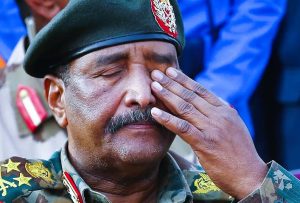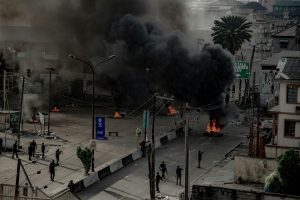Gabon approves new electoral law seen as win for junta leader
3 min readGabon’s transitional parliament recently approved a new electoral law, which has raised concerns among opposition groups who see it as advantageous for junta leader Brice Oligui Nguema. The new law, passed after days of debate, allows members of the security forces and magistrates to run as candidates in elections. Nguema, who assumed power in a military coup last year, has pledged to eventually return power to civilians. However, speculation is growing that he may have ambitions to run for president himself, and the new law is seen by some as a step towards facilitating that possibility.
The opposition has reacted strongly, calling for a formal ban on any military members of the transition committee from running for the presidency. They argue that the law is designed to solidify Nguema’s hold on power and undermine the democratic process. Meanwhile, members of the junta have launched a significant propaganda campaign, which many observers believe is aimed at preparing the political landscape for a potential Nguema presidential candidacy.
One of the key changes introduced by the new law is the creation of two seats in the parliament reserved specifically for the Gabonese diaspora. This move reflects an acknowledgment of the country’s citizens living abroad and their role in the nation’s political life. The law also permits dual nationals to stand for election in all positions except the presidency, without requiring them to give up their second nationality. This is a notable shift, as it opens the door for a wider pool of candidates, though it also raises questions about the loyalty and national allegiance of individuals holding multiple citizenships.
Another important provision of the electoral law is the transfer of responsibility for organizing elections from the local government to the Ministry of the Interior. This change centralizes control over the electoral process, a decision that critics argue could further strengthen the government’s influence over elections and make the process less transparent. By consolidating election administration under the Ministry of the Interior, the government can exercise more direct control, which some fear could undermine the fairness and integrity of future elections.
Nguema’s junta, which seized power in August 2023, has faced significant pressure both internally and from the international community to establish a clear path to civilian rule. The military takeover followed a disputed presidential election, and many observers have expressed concern that the new electoral code may simply serve to consolidate Nguema’s power and prolong military influence in the country’s governance. Despite promises of a return to civilian rule, the junta’s control over key aspects of the political process, such as the approval of this new electoral law, has led to skepticism about the true nature of the transition.
In response to the opposition’s concerns, the junta has emphasized that the new law is part of a broader effort to modernize the country’s electoral system and ensure greater participation, particularly among Gabonese nationals living abroad. While this may resonate with some segments of the population, it has done little to ease the fears of those who see the law as a potential tool for entrenching the junta’s influence.
The decision to include dual nationals in the electoral process has also sparked debate. While it could open the political system to a more diverse group of candidates, it also raises questions about the loyalty of individuals who may hold citizenship in other countries. In a region where political stability is often fragile and foreign influence is a sensitive topic, the inclusion of dual nationals could be seen as a controversial move.
As Gabon moves forward with this new electoral framework, the political landscape remains uncertain. Nguema’s promises to return power to civilians will likely be scrutinized closely, especially given the growing speculation about his own political aspirations. The passage of this electoral law is just the latest chapter in a complex and rapidly evolving political situation. The opposition remains vigilant, and the international community is watching closely, as Gabon’s political future hangs in the balance.
Ultimately, the approval of this new electoral law has the potential to reshape Gabon’s political system, but its true impact will depend on how it is implemented and whether it serves the broader goals of democracy and civilian rule, or if it merely strengthens the junta’s hold on power.





